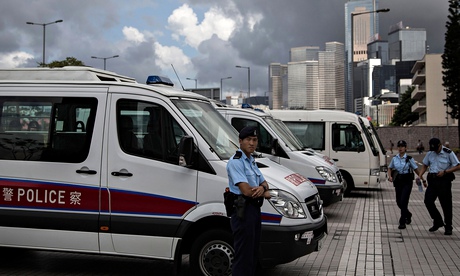China rules out open elections in Hong Kong
Democracy activists prepare protests after standing committee says it will select candidates for leader of Chinese territory
Police officers patrol an area in Hong Kong where protesters from Occupy Central are expected to gather on Sunday. Photograph: Lam Yik Fei/Getty Images

Sunday 31 August 2014
China's legislature has ruled against allowing open nominations in elections for Hong Kong's leader, a decision that promises to ignite political tensions in the Asian financial hub.
The legislature's standing committee ruled that all candidates for chief executive must receive more than half of the votes from a special nominating body before going before voters.
Hong Kong democracy activists have held protests calling for genuine democracy in the Chinese territory, over concerns that candidates would continue to be screened to assess their loyalty to Beijing. They see the nominating committee as beholden to Chinese leaders.
Li Fei, deputy secretary general of the National People's Congress's standing committee, told a news conference that openly nominating candidates would create a "chaotic society".
"These rights come from laws, they don't come from the sky," he said. "Many Hong Kong people have wasted a lot of time discussing things that are not appropriate and aren't discussing things that are appropriate."
In its decision, the committee said: "Since the long-term prosperity and stability of Hong Kong and the sovereignty, security and development interests of the country are at stake, there is a need to proceed in a prudent and steady manner."
It said the 1,200-member nominating committee would select two or three candidates. After one is selected through universal suffrage, the chief executive-elect "will have to be appointed by the central people's government".
Hong Kong has enjoyed substantial political autonomy since returning from British to Chinese rule in 1997. Chinese leaders agreed then that the chief executive would be chosen by "universal suffrage" in 2017 – language that pro-democracy activists say shows Beijing has not kept its promises.
The most high-profile protest group, Occupy Central, calling for a rally Sunday night in the city centre. It has previously threatened to shut down the city's financial district with a sit-in if Beijing does not allow completely open elections for chief executive.
Pro-Beijing activists held their own march two weeks ago in Hong Kong, denouncing Occupy Central as a threat to stability in the city.
Political tensions spiked in June when Chinese officials released a policy white paper declaring that Hong Kong's "high degree of autonomy … comes solely from the authorisation by the central leadership."
Many read the policy paper as asserting Beijing's dominance of Hong Kong's affairs and took to the streets in protest. Occupy Central drew Beijing's rebuke by organising an online referendum that attracted a reported 800,000 votes on how to pick the city's chief executive.
On Sunday, organisers of a similar referendum in the neighbouring Chinese-controlled city of Macau said 95% of the 8,688 participants had voted in favour of a leader being elected by universal suffrage in 2019. Macau's incumbent leader, Fernando Chui, was elected to a second five-year term by a Beijing-friendly committee on Sunday.
